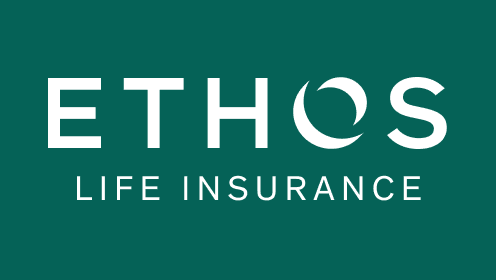This site is a free online resource that strives to offer helpful content and comparison features to our visitors. We accept advertising compensation from companies that appear on the site, which may impact the location and order in which brands (and/or their products) are presented, and may also impact the score that is assigned to it. Company listings on this page DO NOT imply endorsement. We do not feature all providers on the market. Except as expressly set forth in our Terms of Use, all representations and warranties regarding the information presented on this page are disclaimed. The information, including pricing, which appears on this site is subject to change at any time.
Take the guesswork out of life insurance and protect your family from unforeseen financial burdens. We compare the top term life insurance companies to help you choose the best.

Ethos
1,820 peoplevisited this site today

Ladder

Legal & General America

Fabric by Gerber Life

Amica

Bestow

Amplify Life Insurance

Progressive Life Insurance

Corebridge Direct
connected with an insurer this week

Ethos
1,820 peoplevisited this site today
Before diving in and purchasing life insurance, it is vital to understand exactly what features to look for when comparing the best life insurance companies. There are various types of life insurance that are designed to fit a wide variety of needs. Moreover, some providers offer customizable policies with added provisions known as “riders,” which can add valuable benefits.
Learn more about the top life insurance companies
If you are scratching your head wondering, “What is life insurance?" Don't worry. It's not as complicated as it sounds. Life insurance ensures that your spouse and children — or any other individuals who rely on your financial support — are covered in the case you die prematurely.
There are two main types of life insurance: Whole Life and Term Life. Term life insurance policies provide protection for fixed periods of time. For example, 10-, 20- and 30-year term policies at guaranteed rates. Whole life insurance has higher monthly premiums and covers you for the extent of your life or until age 120, whichever comes first.
| Policy Features | Term Life Insurance | Whole Life Insurance |
|---|---|---|
| Choose policy length | ✓ | ✗ |
| Lifelong coverage | ✗ | ✓ |
| Premium doesn't change | ✓ | ✓ |
| Lower premiums | ✓ | ✗ |
| Accumulates cash value (that can also be borrowed from) | ✗ | ✓ |
| Policy receives dividend payments | ✗ | ✓ |
| Provider | Medical exam required? |
|---|---|
| Ladder | ✗ |
| Fabric | ✗ |
| Ethos | ✗ |
Because of its temporary nature, term life insurance policies can provide a substantial amount of coverage at a much lower cost than whole life insurance, especially for younger people.
Term life insurance is often popular among young families because parents typically need more coverage while kids are still living at home. Once your kids grow up and move out, the amount of insurance you need is typically lower since your children are less likely to depend on you financially.
Here are some other good reasons why people consider purchasing term life insurance:
When you are in your 50s and 60s, you don't have to worry about leaving behind your partner with small children and a costly mortgage. So, while term life insurance does not gain cash value, it is also very affordable.
But what about life insurance provided by an employer? If your company offers free life insurance, then sign up for this free benefit — but don't stop there. Many companies offer their employees a certain amount of insurance for free, but this is usually not enough.
Usually, you can purchase supplemental insurance through your company's benefits, but this insurance does not travel with you if you move jobs — unless your company allows you to pay an expensive premium price to take your policy with you. So, if you want to fill in any gaps in coverage and make sure you can take that coverage with you if you change jobs, an individual term life policy might be worth checking out.
It can be daunting to figure this out but evaluate your current financial situation today, and what foreseeable expenses will need to be covered 10 to 20 years down the road.
When deciding how much coverage to purchase, ask yourself these questions:
Whether you choose term or whole life insurance depends on your current and future financial needs. Either one is essential to have, especially if you have loved ones who rely on you for financial stability.
The underwriting process when applying for term life insurance can be significantly longer and more involved than other types of insurance. This is because companies take greater care—for example, medical examinations—to limit their exposure to risk, due to the level of funding that goes into death benefits.
Getting the right life insurance policy can give you and your family peace of mind should your circumstances take a turn for the worse. As this is a very important decision that could affect the future of your family, it’s important to compare all the best life insurance companies available and choose the one that best suits your needs.
*AM Best Rating: A.M. Best's Financial Strength Rating (FSR) is a measure of an insurer's financial strength and ability to pay out claims to policyholders. An "A" rating with A.M. Best indicates that an insurer is considered to be top of the industry in ability to meet ongoing insurance obligations.
*Ethos: Life insurance without an exam requires a few online health questions.
¹Eligibility for Progressive Life Insurance depends on age, health, and additional underwriting factors. The exact policy type, coverage amount, and term length offered will vary.
Ladder Insurance Services, LLC (CA license # OK22568; AR license # 3000140372) distributes term life insurance products issued by multiple insurers – for further details see ladderlife.com. All insurance products are governed by the terms set forth in the applicable insurance policy. Each insurer has financial responsibility for its own products. Coverage amounts vary by state.